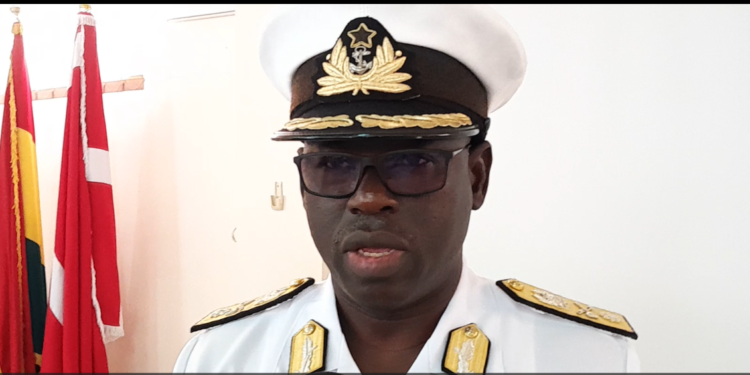By Kemo Cham in Accra
Inability of countries in the Gulf of Guinea (GoG) to domesticate provisions of many international conventions is hindering the fight against maritime crimes in the region, a Maritime Security expert says.
Commodore Samuel Ayelazono, Flag Officer Fleet of the Ghana Navy, says only a small number of countries have domesticated most of the instruments crucial to enhancing their capacity to respond appropriately to maritime security challenges. He also lamented lack of legal expertise to handle cases when they go to court.
One of the most important international instruments relating to maritime security is the UN Convention on the Law of the Sea (UNCLOS), which, among others, stipulates how states should deal with cases of alleged piracy.
“Statistics have it that only six out of the many countries in the region have domesticated the provisions of UNCLOSE relating to piracy,” Commodore Ayelazono told ManoReporters.
The Ghanaian Navy officer, who is an expert in Maritime Security law, on Tuesday made a presentation on Legal and Policy Frameworks on Maritime Security as part of an ongoing training of journalists and communication officials at the Kofi Annan International Peacekeeping Training Center (KAIPTC). The training is part of efforts to promote professional reporting and to raise awareness about maritime security in West and Central Africa.
UNCLOSE was passed by the United Nations Security Council in 1982 and it provides a comprehensive regulatory framework for governance of the ocean.
The GoG is a geographical region from West to Central Africa endowed with vast wealth of resources and whose coastal line serves as a popular route for ships. Countries in the GoG are said to produce about 70 percent of Africa’s oil production. They also are rich in resources like gold, diamonds and fisheries. All of these make the region a major attraction for criminals targeting ships loaded with cargo in the last decade, including piracy and armed robbery.
Although data show that piracy incidents are declining in the region, reports indicate that other crimes, particularly armed robbery, persist. And experts are warning that efforts that led to the progress of the last two years need to be sustained to prevent a comeback of the criminal gangs.
Commodore Ayelazono in a two-hour long presentation said the legal frameworks is as crucial a component as the expertise in the regional efforts to maintain this trajectory. He noted that shortage of lawyers and judges who are well trained in maritime law also constituted a challenge for the region.
Ayelazono faulted the absence of adequate advance training opportunities in maritime security laws for the status quo.
Ghana, for instance, which has been a leader in maritime security training, only introduced a Master’s degree programme in Maritime law in 2023. Given the reliance on some neighbouring countries for such expertise on Ghana, Ayelazono believes this is too little too late.
“If at the operational level the ships go out and patrol our waters and arrest pirates, we should have the legal framework in place to try the pirates, convict them and punish them appropriately. So, without the legal framework, efforts at the operational level will not be yielding the results that we are looking for,” he said.
Commodore Ayelazono stressed that gains made against piracy in some of the countries that have domesticated the relevant provision, singling out Nigeria, demonstrate the significance of not just putting the law in place but also implementing it.
“Nigeria has passed one and I think it’s a good step. They have convicted pirates based on their piracy Act and I am sure it sent a message to the criminal community that if you are arrested you can be tried and punished accordingly,” he said.






















